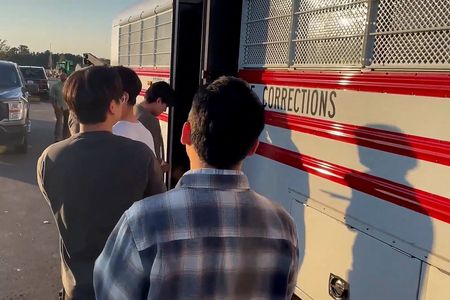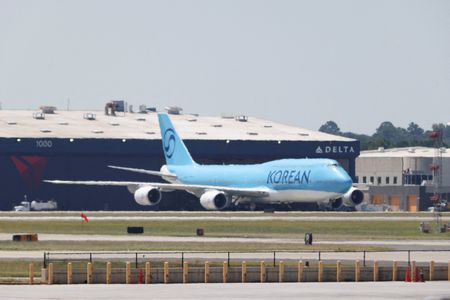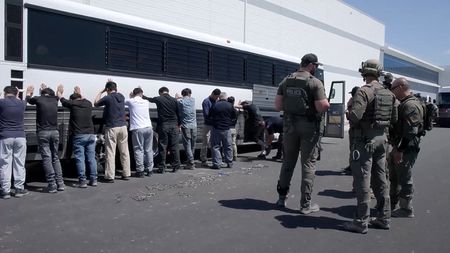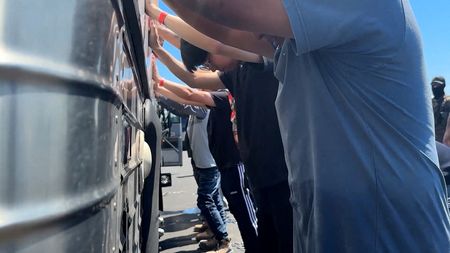By David Brunnstrom, Hyunjoo Jin and Jihoon Lee
WASHINGTON/SEOUL (Reuters) - South Korea asked its ally the United States on Wednesday to allow hundreds of Korean workers to leave the country quickly and without handcuffs after they were detained in an immigration raid on a Hyundai construction site in the state of Georgia.
South Korean Foreign Minister Cho Hyun made the request at a White House meeting with U.S. Secretary of State Marco Rubio.
"Cho strongly requested the special attention and support of the U.S. administration so that detained Koreans can leave the U.S. quickly without physical restriction by handcuffs, etc., as they are not criminals," South Korea's foreign ministry said.
About 300 South Koreans were arrested last week along with 175 others at the site of the $4.3 billion Hyundai Motor and LG Energy Solution project to build batteries for electric cars in Georgia.
Cho proposed South Korea and the U.S. discuss creating a new visa category to prevent future issues, South Korea's foreign ministry said. He also asked that the detained workers not be disadvantaged if they want to visit the U.S. again.
The raid - the largest single-site enforcement operation in the history of the U.S. Department of Homeland Security's investigative operations - sent shockwaves through South Korea, which has been trying to finalise a trade deal with Washington.
South Korea's foreign ministry had said earlier on Wednesday that it was working with U.S. authorities to bring home the workers, though it would be difficult to fly them back on Wednesday due to unspecified U.S. circumstances.
The U.S. State Department did not mention the immigration issue in a readout of Rubio's meeting with Cho, but cited Rubio as saying the United States welcomed South Korean investment and that the two discussed promoting a fair and reciprocal trade partnership.
It said they also discussed expanding "equitable defense burden sharing," a reference to U.S. calls for Seoul to pay more for the presence of U.S. troops in South Korea.
According to South Korea's foreign ministry, Rubio told Cho that President Donald Trump had ordered him to promptly consult and take action to ensure South Korea's wishes "are met as much as possible."
U.S. immigration authorities routinely handcuff and shackle immigrants when they are put on deportation flights, a practice that has drawn criticism from some countries, including Colombia and Brazil.
KOREANS 'HURT AND SHOCKED'
Cho told Rubio that Koreans were "hurt and shocked" by the arrest of workers "who came to the U.S. to transfer technology and know-how to contribute to the Trump administration's efforts to revive the U.S. manufacturing industry," South Korea's foreign ministry said.
Representatives of Korean companies, including Hyundai Motor and LG, urged Seoul to negotiate a new type of visa for Korean professionals and to get clearer guidelines to reduce uncertainty and support their businesses in the United States, South Korea's foreign ministry said.
Korean businesses have complained about strict U.S. limits on visas for skilled foreign workers, which they say make it difficult for them to oversee construction of factories or to train local workers.
Many of the detained workers are employees of subcontractors involved in the project. South Korean media said a smaller number of Japanese and Chinese nationals had also been arrested during the raid.
Trump said in a social media post on Sunday that the U.S. would make it "quickly and legally possible" for foreign companies to bring their staff into the U.S. if they respected immigration laws.
Asked on Tuesday about potential changes to the U.S. visa system, White House spokeswoman Karoline Leavitt told a news briefing: "The Department of Homeland Security and the Department of Commerce are working on this matter together."
(Reporting by Hyunjoo Jin, Joyce Lee, Ju-min Park, Heejin Kim and Jihoon Lee in Seoul and David Brunnstrom, Katharine Jackson, David Shepardson and Ted Hesson in Washington; Editing by Ed Davies, Saad Sayeed, Nia Williams and Daniel Wallis)










